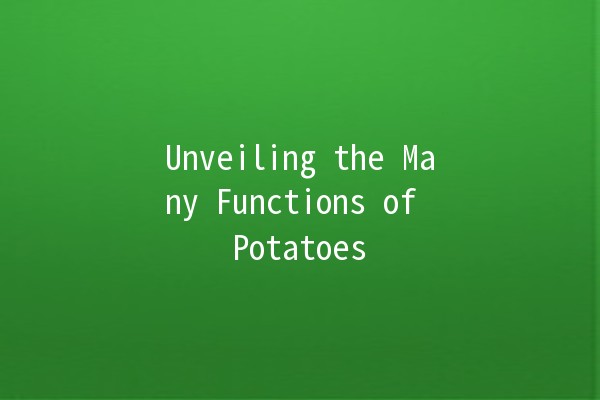Potatoes are more than just a staple food; they are a versatile ingredient that can enhance your culinary adventures, boost health, and even play roles beyond the kitchen! This article delves into the various functions of potatoes, revealing their multifaceted uses. From nutrition to household applications, we'll explore at least five productivityenhancing tips—complete with practical applications for each. By the end of this article, you'll appreciate the humble potato in a new light!
Nutritional Powerhouse
Potatoes are often unfairly dismissed as unhealthy, but they are packed with essential nutrients. A medium potato contains about 110 calories, primarily from carbohydrates, making it a great source of energy. Additionally, potatoes are rich in vitamins and minerals, especially vitamin C, vitamin B6, potassium, and dietary fiber.
Tip 1: Boost Your Diet with Potatoes
Application: Incorporate more potatoes into your meals for enhanced nutrition. Try swapping out rice or pasta for roasted sweet potatoes or mashed potatoes. Not only do they provide similar textures and flavors, but they also contribute essential nutrients that promote better health.

Example Recipe: Sweet Potato Mash
Boil peeled sweet potatoes until tender.
Mash them with a splash of almond milk and a pinch of cinnamon for a delicious twist. This dish not only satisfies but also provides betacarotene and antioxidants!
Culinary Versatility
Potatoes are incredibly versatile and can be prepared in countless ways, from boiling and baking to frying and mashing. This flexibility allows them to complement a wide array of dishes.
Tip 2: Experiment with Potato Varieties
Application: Explore different potato varieties to discover unique flavors and textures. Common types include Russet, Yukon Gold, and Red Potatoes. Each type has its unique qualities suited for various cuisines.
Example Dish: Hasselback Potatoes
Slit a Yukon Gold potato multiple times but not all the way through.
Brush with garlic butter, sprinkle with herbs, and bake until crispy, allowing the flavors to meld beautifully.
Health Benefits
Potatoes have numerous health benefits when consumed in moderation. They are glutenfree and can be suitable for people with gluten intolerance. Furthermore, potatoes can help regulate blood sugar levels due to their high fiber content.
Tip 3: Use Potatoes for Healthy Snacking
Application: Turn potatoes into healthy alternatives for snacking. Opt for baked potato wedges or thinly sliced baked crisps instead of fried chips.
Example Snack: Baked Potato Wedges
Cut potatoes into thick wedges, toss with olive oil and your choice of seasonings, and bake until golden. This option is satisfying and much lighter than traditional chips!
Potatoes in Everyday Life
Beyond the dining table, potatoes have various functions in daily life, including beauty hacks and household remedies.
Tip 4: Unlock Potato's Household Applications
Application: Take advantage of the unique properties of potatoes. They are excellent for removing tarnish from silver, soothing skin irritations, and even cleaning glass.
Example Uses:
Silver Polish: Cut a potato in half and rub it on tarnished silverware. The oxalic acid in the potato helps lift the tarnish.
Soothe Skin: Apply raw potato slices to insect bites or sunburns for relief.
Culinary Creativity with Potatoes
Embrace your creativity with potatoes by incorporating them into meals in unexpected ways. Not only can they be the star ingredient, but they can also add texture, flavor, and nutrition to a wide range of dishes.
Tip 5: Make Innovative Potato Dishes
Application: Transform traditional recipes using potatoes. Add them to soups, stews, salads, or even desserts!
Example Dessert: Potato Pancakes
Mix grated cooked potatoes with flour, eggs, and a touch of sugar. Cook on a griddle until golden brown. These sweet variations can be served with syrup or fruit.
Frequently Asked Questions
Making potatoes healthier often involves how you prepare them. Opt for baking, boiling, or steaming instead of frying. Use spices and herbs to flavor them instead of butter or cream.
While potatoes are nutritious, overconsumption, especially of fried potatoes, can lead to unhealthy habits. It's important to balance their intake with other vegetables and maintain variety in your meals.
Yes, you can eat potatoes if you manage your portion sizes and preparation methods. Choosing sweet potatoes and pairing them with protein can help stabilize blood sugar levels.
Keep potatoes in a cool, dark, and wellventilated area to prevent sprouting and spoilage. Avoid refrigeration, as it can make them sweet and change their texture.
Yes! Potato skins are rich in fiber and contain various nutrients. When consuming potatoes, consider leaving the skin on for added health benefits.
Potatoes are naturally vegan and can be a staple in a plantbased diet. Use them in salads, casseroles, soups, or as a base for vegetable curries to add heartiness to your meals.
The Remarkable Potato
As we’ve explored, potatoes are a remarkable food with diverse applications—nutritionally, culinarily, and even in household uses. With a little creativity, you can harness the full potential of this humble root vegetable in various aspects of your life. So, next time you reach for a potato, remember that you’re not just grabbing an ingredient; you’re holding a powerhouse of nutrition and versatility. Enjoy experimenting with potatoes in your kitchen and beyond!